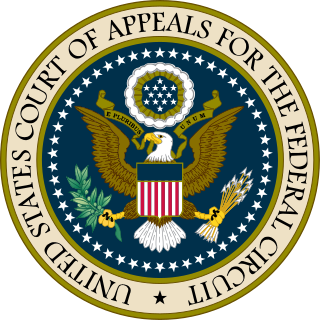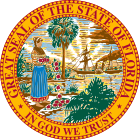Precedent is a principle or rule established in a legal case that becomes authoritative to a court or other tribunal when deciding subsequent cases with similar legal issues or facts. The legal doctrine stating that courts should follow precedent is called stare decisis.
In the United States, a state supreme court is the highest court in the state judiciary of a U.S. state. On matters of state law, the judgment of a state supreme court is considered final and binding in both state and federal courts.

The United States courts of appeals are the intermediate appellate courts of the United States federal judiciary. They hear appeals of cases from the United States district courts and some U.S. administrative agencies, and their decisions can be appealed to the Supreme Court of the United States. The courts of appeals are divided into 13 "Circuits". Eleven of the circuits are numbered "First" through "Eleventh" and cover geographic areas of the United States and hear appeals from the U.S. district courts within their borders. The District of Columbia Circuit covers only Washington, DC. The Federal Circuit hears appeals from federal courts across the United States in cases involving certain specialized areas of law.
In law, certiorari is a court process to seek judicial review of a decision of a lower court or government agency. Certiorari comes from the name of an English prerogative writ, issued by a superior court to direct that the record of the lower court be sent to the superior court for review. The term is Latin for "to be made more certain", and comes from the opening line of such writs, which traditionally began with the Latin words "Certiorari volumus...".

The Supreme Court of California is the highest and final court of appeals in the courts of the U.S. state of California. It is headquartered in San Francisco at the Earl Warren Building, but it regularly holds sessions in Los Angeles and Sacramento. Its decisions are binding on all other California state courts. Since 1850, the court has issued many influential decisions in a variety of areas including torts, property, civil and constitutional rights, and criminal law.

The United States Court of Appeals for the Federal Circuit is one of the 13 United States courts of appeals. It has special appellate jurisdiction over certain categories of specialized cases in the U.S. federal court system. Specifically, it has exclusive appellate jurisdiction over all U.S. federal cases involving patents, trademark registrations, government contracts, veterans' benefits, public safety officers' benefits, federal employees' benefits, and various other types of cases. The Federal Circuit has no jurisdiction over criminal, bankruptcy, immigration, or U.S. state law cases. It is headquartered at the Howard T. Markey National Courts Building in Washington, DC.

The Supreme Court of Florida is the highest court in the U.S. state of Florida. It consists of seven justices—one of whom serves as Chief Justice. Six members are chosen from six districts around the state to foster geographic diversity, and one is selected at large.
The federal judiciary of the United States is one of the three branches of the federal government of the United States organized under the United States Constitution and laws of the federal government. The U.S. federal judiciary consists primarily of the U.S. Supreme Court, the U.S. Courts of Appeals, and the U.S. District Courts. It also includes a variety of other lesser federal tribunals.

The California Courts of Appeal are the state intermediate appellate courts in the U.S. state of California. The state is geographically divided along county lines into six appellate districts. The Courts of Appeal form the largest state-level intermediate appellate court system in the United States, with 106 justices.

The Supreme Court of Georgia is the highest judicial authority of the U.S. state of Georgia. The court was established in 1845 as a three-member panel, increased in number to six, then to seven in 1945, and finally to nine in 2017. Since 1896, the justices have been elected by the people of the state. The justices are currently elected in statewide non-partisan elections for six-year terms, with any vacancies filled through an appointment by the Governor.

The Florida First District Court of Appeal, also known as the First DCA, is headquartered in Tallahassee, Florida, the state capital. It is unique among the six Florida District Courts of Appeal in that, much like the U.S. Court of Appeals for the D.C. Circuit at the federal level, it handles most of the appeals in state administrative law matters. It is also solely responsible for handling appeals in workers' compensation cases. It is the Court of Appeals for 29 Florida counties, covering the Panhandle as well as the north-central parts of the state. The First DCA includes the following: First Circuit ; Second Circuit ; Third Circuit ; Eighth Circuit ; and Fourteenth Circuit.

The Florida Second District Court of Appeal is headquartered in Tampa, Florida on the campus of Stetson University College of Law. It will move to St. Petersburg when the new Pinellas courthouse is complete.

In United States federal courts, a circuit split, also known as a split of authority or split in authority, occurs when two or more different circuit courts of appeals provide conflicting rulings on the same legal issue. The existence of a circuit split is one of the factors that the Supreme Court of the United States considers when deciding whether to grant review of a case. Some scholars suggest that the Supreme Court is more likely to grant review of a case to resolve a circuit split than for any other reason.

The Florida circuit courts are state courts and trial courts of original jurisdiction for most controversies. In Florida, the circuit courts are one of four types of courts created by the Florida Constitution.
The Georgia Court of Appeals is the intermediate-level appellate court for the U.S. state of Georgia.
The Government of Guam (GovGuam) is a presidential representative democratic system, whereby the president is the head of state and the governor is head of government, and of a multi-party system. Guam is an organized, unincorporated territory of the United States with policy relations between Guam and the US under the jurisdiction of the Office of Insular Affairs.
The Florida State Courts System is the unified state court system of Florida.

The Florida Sixth District Court of Appeal (DCA) is headquartered in Lakeland, Florida.











